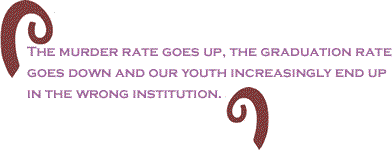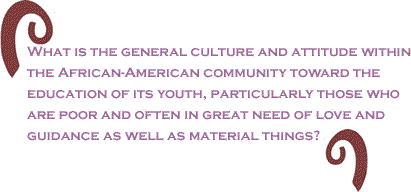| The failure
of public education in the United States to effectively
address the needs of students, or the nation, has been spotlighted
by the movie, "Waiting for Superman." Whatever
one thinks of its point of view, the movie has made the
failure of public education part of the national conversation--a
much needed development. Despite the reality, known since
the mid-1980s, that the nation's schools are grossly inadequate,
there has been a deafening silence about their dismal failure,
particularly in relation to the needs of students of African-American
descent.
The murder rate goes up, the graduation rate goes down and
our youth increasingly end up in the wrong institution.
Regrettably, African-American adults and community leaders
have been seemingly preoccupied with other problems. It
seems to take all the energy most parents can mobilize to
take care of the needs of their own children. Scattered
group efforts at educational improvement have led to extremely
few sustained attempts at change, with varying degrees of
success. Education is, after all, a complicated and time-consuming
affair.

The discussion
generated by the movie has been promoted and highlighted
by Oprah Winfrey, MSNBC-TV, numerous news and special TV
programs, and an excellent article in the September 30,
2010, issue of The Root, the online news magazine aimed
at the black community. Written by R. L'Heureux Lewis, an
assistant professor of sociology and black studies at the
City College of New York, the article, titled "Waiting
for School Reform," provides an overview of the difficulties
confronting efforts at educational improvement, including
the enormous financial costs and the lack of comprehensive
research. However, as noted in a comment by a reader, E.
Cederwell, it only superficially touches on "the single
most important element explaining the great disparities
in any school's ability to achieve educational success:
the world outside the classroom, and in particular, the
culture each young person is surrounded by." Cederwell
states that "the perceived value of learning and education
. . . is hugely important. . . . Communities need to be
ready to take a . . . searching examination, and, where
indicated, be willing to commit to adopt certain values.
This may be hardest of all."
Query: What is the general culture and attitude within the
African-American community toward the education of its youth,
particularly those who are poor and often in great need
of love and guidance as well as material things? In using
the word "community," we are not talking about
a geographical space, but a cultural configuration of persons
who have a shared history, values, and life circumstances.
This focus elicits a multitude of complications, given the
current lack of cohesion in the African-American "community,"
which many believe is becoming irreparably splintered along
economic lines.

The discussion
generated by "Waiting for Superman" has focused
on the funding of education and the roles of politicians,
administrators, principals, parents, and especially teachers
and unions. However, it has failed to seriously address
the difficult, dominant, and ubiquitous role of the African-American
community -- its values, its place in the larger society,
and its history. What can African-American individuals,
community organizations, professional organizations, labor
unions, athletes, entertainers, churches, women's groups,
men's groups, and other components of civil society do to
send the message to our young people that education is important,
that it is cool, that it is vital to the good life, that
it is a requirement for an interesting and safe environment,
that it can be exciting, and that it makes you a better,
more desirable individual, mate and parent? How can we create
an environment that convinces our young people that education
has more rewards than merely hanging out and, for most people,
more concrete rewards than athletics and music and selling
drugs?
How can we make education a dominant, outstanding value
in the African-American community, like it was in the early
20th century, and like it currently is in several other
communities in the United States? Those of us who were born
in the early or mid-20th century remember the dictum that
"you've got to be twice as good." And we all know
the important role of the family in forming character and
promoting educational values. But as African Americans we
also know that many of our families today have been so damaged
by a variety of forces that they do not have the will or
the resources to be what we are saying they must be in terms
of an educational support system for their children. And
while we must do everything possible to help them overcome
their liabilities, if their children are to be rescued we
must also do everything within our power as a community
to compensate for what parents lack.
Despite the seeming lack of involvement of the black community
in the education of its youth, many individuals and groups
actually are addressing this question. Individuals and organizations
are providing scholarships, from the Ron Brown Scholar Program,
which contributes close to $800,000 in scholarships annually,
to people who contribute a couple of scholarships of $500
a semester to youth in their church. People are becoming
mentors and big sisters and big brothers. They act as tutors
for specific subjects. Professionals and business people
visit schools and lecture about the work they do and how
students can prepare themselves for various careers. Others
invite students to visit or work in their offices during
summer vacation. Churches provide space and material for
after-school programs. Contributions of books to enrich
libraries, particularly with material on specific ethnic
groups, are given to schools. I'm sure readers can add to
this list. It's not that nothing is being done, it is instead
that we need much, much more and we need to do it more loudly
and, in some instances, in a more organized way. We need
to find more ways to publicly recognize and reward those
children who work hard to achieve. We need everybody to
know how important education is.

Perhaps
we need a national organization to do for education what
the Student Nonviolent Coordinating Committee (SNCC) did
for voting in the 1960s. Maybe we can call it something
like "Community Campaign for Educational Excellence"
(CCEE). Perhaps we need to clearly explain what is meant
when we say that "education is today what civil rights
was in the 1960s." We need to make it clear that we
are talking about a similar urgency and significance and
deterrent to equality, not about tactics like marches or
content like legislation. The civil rights movement of the
1960s eliminated the state and local laws that restricted
the movement and behavior of blacks. The educational movement
of the 21st century must create educational institutions
that serve the needs of all of the country�s children.
There are multiple ways the African-American community can
change its culture in order to create an environment where
education is recognized and honored. These ways are limited
only by the imagination. There are, however, three basic
requirements: First, we must care about all African-American
children and have a burning need to save them from the lives
of violence and crime and unemployment and meaninglessness
that so many of them are living or facing. Second, we must
truly believe that all children can be educated. And third,
we must be willing to reach out and touch -- to contribute
our time, our energy, and our material resources, however
limited they may be, to the salvation of our youth. African-American
youth, given today's dominant economic and social condition
and trends, are in grave danger. What do we intend to do?

BlackCommentator.com
Guest Commentator Elinor Bowles is a retired editor and
activist. Click here
to contact Ms. Bowles. |

